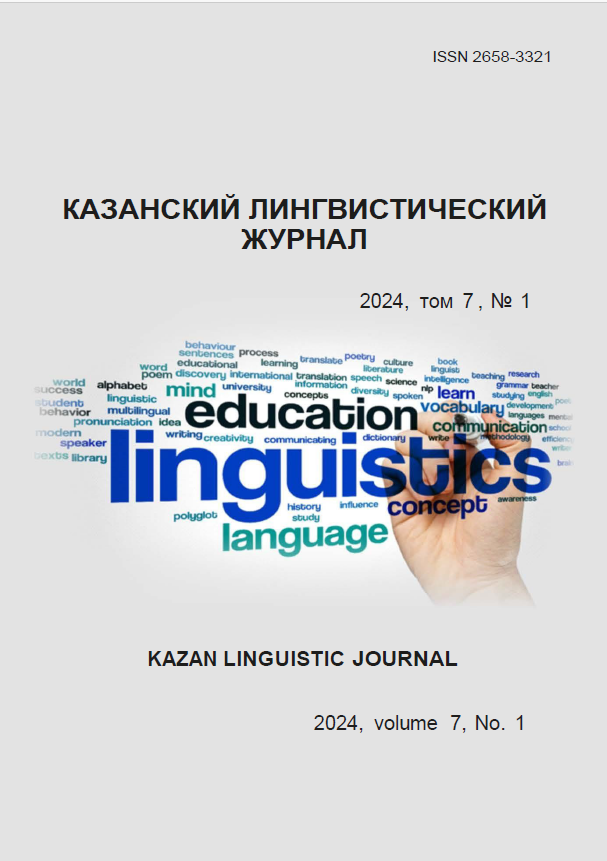Gendered Perception of Urban and Rural Environment in the Consciousness of the Victorian Era
https://doi.org/10.26907/2658-3321.2024.7.1.85-94
Keywords:
Gender, binary, masculinity, femininity, Gaskell, Victorian eraAbstract
This article analyses the language means used in the novel by Elizabeth Gaskell «North and South» when describing urban and rural areas. The relevance of thе study is due to the growing role of gender studies in the language, within which the linguoculturological analysis of gender associations in the minds of natural language speakers becomes important. The study is based on the understanding of gender as a binary construct that actualizes the oppositional perception of masculinity and femininity. The consciousness of England in the Victorian era is characterized not only by the binary perception of gender-role relations, but also by the symbolic opposition of urban and rural areas, formed as a result of the industrial revolution. In order to determine the associative relationship between gender and the urban/rural environment, 349 original contexts were selected that describe the realities of life in one of the spaces. The result of the study showed that the urban environment in the minds of the Victorian era is associated with several categories of masculinity, while the countryside has feminine qualities. The study revealed the deconstruction of some gender stereotypes and oppositions, which indicates a more multifaceted perception of gender structures that goes beyond the bipolar.
References
References
Kirilina A.V. Gender and gender linguistics at the border of the millennium. Journal of Psycholinguistics. 2021;3(49):109–147. DOI 10.30982/2077- 5911-2021-49-3-109-147 (In Russ.)
Likhovid A.A. On the difficulties of literary translation: on the verge between crea-tive rethinking and translation errors. Humanities and law research. 2022; 9(4):659–666. DOI 10.37493/2409-1030.2022.4.18 (In Russ.)
Katermina V.V. Language personality of an author in a literary text. Chelovek. Kul’tura. Obrazovanie. 2016;1(19):205–213. (In Russ.)
Serebryakova S.V., Milostivaya A.I. Semantic emergence as a translation problem. Vestnik Volgogradskogo gosudarstvennogo universiteta. Seriya 2, Yazykoznanie. 2017;16(3):48–57. (In Russ.)
Dezhina T.P. Stages of formation of the concet “gender”in foreighn and Russian lin-guistics. Philology. Theory and Practice. 2017;4(70):76–79.
Serebryakova S.V. Cognitive dissonance theory as interpretation framework for in-terpersonal relations of characters. Issues of cognitive linguistics. 2018;1:137–143. (In Russ.)
Gaskell E.С. North and South. Wordsworth Editions Limited; 1994.
Conway J.K., Bourque S.C., Scott J.W. Introduction: the concept of gender. Daeda-lus. 1987;4(116).
Gritsenko E.S., Sergeyeva M.V. Current trends in gender conceptualization and their reflection in English learner’s dictionaries. Voprosy leksikografii. 2020;18:22–47. DOI 10.17223/22274200/18/2 (In Russ.)
Lopukhova O.G. Common and cultural specific features of the content of gender im-ages in modern conscience. Vestnik TGGPU. 2010;1(19). (In Russ.)
Oparina A.V. Issues of the science of gender. Manliness and femininity as cultural concepts of gender linguistics. Vestnik of Volzhsky University named after V. N. Tatishchev. 2011;7. (In. Russ.)
Frawley M. The Victorian Age, 1832-1901. English Literature in Context. Edited by P. Poplawski. Cambridge University Press; 2017. P. 364–469.






